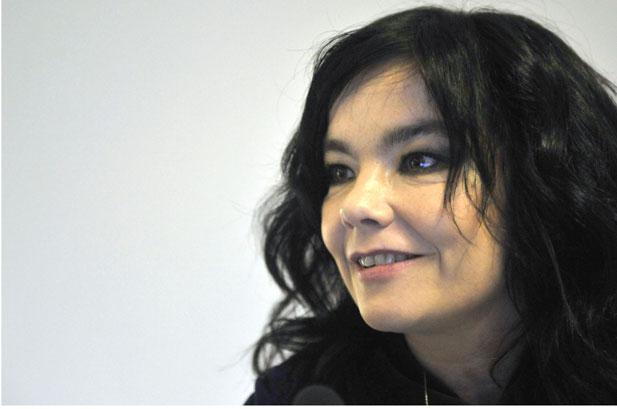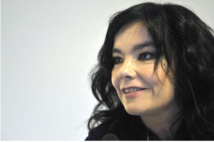Unlike Madonna, who was livid when her unfinished songs found their way onto the Internet last month, Bjork -- in public, at least -- took the leaks in stride as she put "Vulnicura" on sale online and thanked fans for their interest.
With lush strings over a haunting electronic backdrop, "Vulnicura" is, in Bjork's description, a "complete heartbreak album" in which she documented a "pretty much accurate emotional chronology" of her breakup.
"First I was worried it would be too self-indulgent, but then I felt it might make it even more universal," Bjork wrote on Facebook and Twitter.
"And hopefully the songs could be a help, a crutch to others and prove how biological this process is: the wound and the healing of the wound -- psychologically and physically. It has a stubborn clock attached to it," she wrote.
Bjork has generally been private about her personal life but Icelandic media reported in 2013 that she split from her longtime partner Matthew Barney, the avant-garde New York filmmaker and sculptor with whom she has a daughter.
- A gentle despair -
"Vulnicura" is Bjork's first work since 2011's "Biophilia," a wildly ambitious album that used smartphone apps to explore the interconnections between music, technology and nature.
Bjork teamed up on the latest album with Arca, the Venezuelan DJ known for his work with the rapper Kanye West and the rising trip-hop star FKA twigs.
The collaboration led to some speculation that Bjork was returning to her pop roots. Instead, Bjork goes in an even more abstract direction than on her previous work, with Arca crafting electronic beats that gently complement rather than dominate Bjork's distinctive voice and her string arrangements recorded in Iceland.
"History of Touches," an account of the lonely contemplation of love that has ended, echoes the themes of Bjork's classic 1996 song of despair "Hyperballad" -- only that the thoughts this time are much sweeter.
"I wake you up in the night, feeling this is our last time together," Bjork sings over an eerie keyboard backdrop, imagining her lovemaking "in a wondrous time lapse."
On "Lionsong," Bjork -- the mournful strings tracing the longing in her voice -- sings, "Maybe someday he will come out of this."
"Once it was simple / One feeling at a time / It reached its peak, then transformed," Bjork sings, with a hint of the Bollywood-inspired orchestration from her track "Venus As a Boy" off her 1993 "Debut."
Bjork refuses to give in to songwriting conventions on "Vulnicura." On "Black Lake," which runs over 10 minutes long, she asks, "Did I love you too much?" The answer, expressed not in words but in the music, lies in silence and fermata stretches of the strings.
Arca, whom Bjork described as her best-ever collaborator, shows his influence most clearly on the closing track "Quicksand" as the electronica finally takes center-stage and the album ends with a sense both of energy and surprise.
Album leaks have become increasingly common in an era when copying music requires little technical skill and pirate sites have eager audiences.
Bjork, who is also planning CD and vinyl sales of "Vulnicura," had hoped to roll out the album in March when she will play several intimate concerts in New York including at Carnegie Hall, one of the world's most prestigious classical venues.
Bjork, who turns 50 later this year, will also be the subject of a retrospective exhibit in March at New York's Museum of Modern Art.
-------------------------------------------------------------------------------------------------------
With lush strings over a haunting electronic backdrop, "Vulnicura" is, in Bjork's description, a "complete heartbreak album" in which she documented a "pretty much accurate emotional chronology" of her breakup.
"First I was worried it would be too self-indulgent, but then I felt it might make it even more universal," Bjork wrote on Facebook and Twitter.
"And hopefully the songs could be a help, a crutch to others and prove how biological this process is: the wound and the healing of the wound -- psychologically and physically. It has a stubborn clock attached to it," she wrote.
Bjork has generally been private about her personal life but Icelandic media reported in 2013 that she split from her longtime partner Matthew Barney, the avant-garde New York filmmaker and sculptor with whom she has a daughter.
- A gentle despair -
"Vulnicura" is Bjork's first work since 2011's "Biophilia," a wildly ambitious album that used smartphone apps to explore the interconnections between music, technology and nature.
Bjork teamed up on the latest album with Arca, the Venezuelan DJ known for his work with the rapper Kanye West and the rising trip-hop star FKA twigs.
The collaboration led to some speculation that Bjork was returning to her pop roots. Instead, Bjork goes in an even more abstract direction than on her previous work, with Arca crafting electronic beats that gently complement rather than dominate Bjork's distinctive voice and her string arrangements recorded in Iceland.
"History of Touches," an account of the lonely contemplation of love that has ended, echoes the themes of Bjork's classic 1996 song of despair "Hyperballad" -- only that the thoughts this time are much sweeter.
"I wake you up in the night, feeling this is our last time together," Bjork sings over an eerie keyboard backdrop, imagining her lovemaking "in a wondrous time lapse."
On "Lionsong," Bjork -- the mournful strings tracing the longing in her voice -- sings, "Maybe someday he will come out of this."
"Once it was simple / One feeling at a time / It reached its peak, then transformed," Bjork sings, with a hint of the Bollywood-inspired orchestration from her track "Venus As a Boy" off her 1993 "Debut."
Bjork refuses to give in to songwriting conventions on "Vulnicura." On "Black Lake," which runs over 10 minutes long, she asks, "Did I love you too much?" The answer, expressed not in words but in the music, lies in silence and fermata stretches of the strings.
Arca, whom Bjork described as her best-ever collaborator, shows his influence most clearly on the closing track "Quicksand" as the electronica finally takes center-stage and the album ends with a sense both of energy and surprise.
Album leaks have become increasingly common in an era when copying music requires little technical skill and pirate sites have eager audiences.
Bjork, who is also planning CD and vinyl sales of "Vulnicura," had hoped to roll out the album in March when she will play several intimate concerts in New York including at Carnegie Hall, one of the world's most prestigious classical venues.
Bjork, who turns 50 later this year, will also be the subject of a retrospective exhibit in March at New York's Museum of Modern Art.
-------------------------------------------------------------------------------------------------------









 Home
Home Politics
Politics











